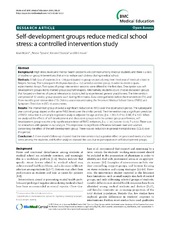| dc.contributor.author | Holm, Mari | en_US |
| dc.contributor.author | Tyssen, Reidar | en_US |
| dc.contributor.author | Stordal, Kirsten Irene | en_US |
| dc.contributor.author | Haver, Brit | en_US |
| dc.date.accessioned | 2011-04-26T09:28:19Z | |
| dc.date.available | 2011-04-26T09:28:19Z | |
| dc.date.issued | 2010-03-16 | eng |
| dc.Published | BMC Medical Education 10:23 | en_US |
| dc.identifier.issn | 1472-6920 | |
| dc.identifier.uri | https://hdl.handle.net/1956/4698 | |
| dc.description.abstract | Background High stress levels and mental health problems are common among medical students and there is a lack of studies on group interventions that aim to reduce such distress during medical school. Methods A full class of students (n = 129) participated in group sessions during their third year of medical school in Bergen, Norway. The subsequent third-year class (n = 152) acted as control group, in order to create a quasi-experimental design. Two types of group intervention sessions were offered to the first class. One option was self-development groups led by trained group psychotherapists. Alternatively, students could choose discussion groups that focused on themes of special relevance to doctors, led by experienced general practitioners. The intervention comprised of 12 weekly group sessions each lasting 90 minutes. Data were gathered before the intervention (T1), and three months post intervention (T2). Distress was measured using the Perceived Medical School Stress (PMSS) and Symptom Check List-5 (SCL-5) assessments. Results The intervention group showed a significant reduction in PMSS over the observation period. The subsequent year control group stayed on the same PMSS levels over the similar period. The intervention was a significant predictor of PMSS reduction in a multiple regression analysis adjusted for age and sex, β = -1.93 (-3.47 to -0.38), P = 0.02. When we analysed the effects of self-development and discussion groups with the control group as reference, self-development group was the only significant predictor of PMSS reduction, β = -2.18 (-4.03 to -0.33), P = 0.02. There was no interaction with gender in our analysis. This implicates no significant difference between men and women concerning the effect of the self-development group. There was no reduction in general mental distress (SCL-5) over this period. Conclusion A three-month follow-up showed that the intervention had a positive effect on perceived medical school stress among the students, and further analyses showed this was due to participation in self-development groups. | en_US |
| dc.language.iso | eng | eng |
| dc.publisher | BioMed Central | eng |
| dc.rights | Attribution CC BY | eng |
| dc.rights.uri | http://creativecommons.org/licenses/by/2.0 | eng |
| dc.title | Self-development groups reduce medical school stress: a controlled intervention study | en_US |
| dc.type | Peer reviewed | |
| dc.type | Journal article | |
| dc.description.version | publishedVersion | en_US |
| dc.rights.holder | Holm et al. | |
| dc.rights.holder | Copyright 2010 Holm et al; licensee BioMed Central Ltd. | |
| dc.identifier.doi | https://doi.org/10.1186/1472-6920-10-23 | |
| dc.identifier.cristin | 524801 | |
| dc.subject.nsi | VDP::Medical disciplines: 700 | eng |

